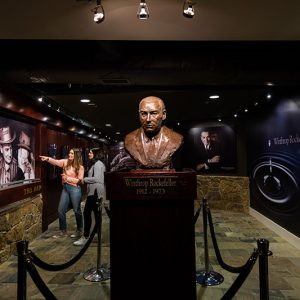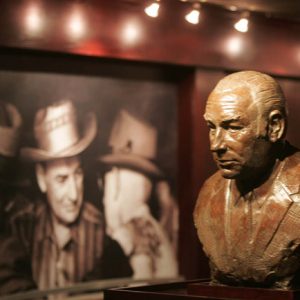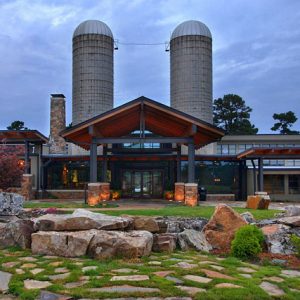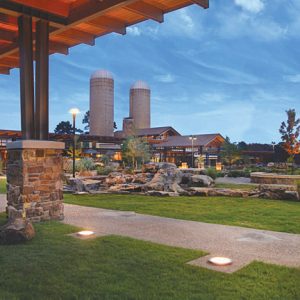calsfoundation@cals.org
Winthrop Rockefeller Institute
The Winthrop Rockefeller Institute (commonly called the Rockefeller Institute or the Institute) is a 501(c)(3) nonprofit organization that seeks to continue the legacy of the late Governor Winthrop Rockefeller. The Institute’s workshops, seminars, public lectures, conferences, and special events are designed to nurture ideas, policies, and activites to make life better for Arkansans. The Rockefeller Institute follows what it terms the Rockefeller Ethic, drawing on Rockefeller’s leadership style, which focused on collaborative problem solving, diversity of opinion, and respectful dialogue.
The Winthrop Rockefeller Institute is located on Petit Jean Mountain near Morrilton (Conway County), on 188 acres of the original grounds of Winrock Farms, Governor Rockefeller’s model cattle farm. The Institute is a 509(a)(3) supporting organization of the University of Arkansas System, and the UA System president appoints the Institute’s board of directors.
Winthrop Rockefeller died in 1973, and, that same year, the nonprofit Winrock International was established on Petit Jean, using the buildings and grounds of Rockefeller’s former home and ranch. In 2004, Winrock vacated the facilities on Petit Jean and relocated to Little Rock (Pulaski County) and Washington DC. The property reverted to the Winthrop Rockefeller Charitable Trust. The trust leased the facilities to the UA System and gave the system $53 million to fund the development of a master plan that addressed the areas of capital improvements, operations, and educational programs. The Winthrop Rockefeller Institute was established in July 2005.
This master plan included the adaptive reuse and remodeling of 30,000 square feet of space, including restoring barns built when Winthrop Rockefeller first developed the property as a cattle ranch. It also involved the construction of new lodging facilities and the addition of pedestrian access, landscaping, and demonstration gardens. In January 2010, the Historic Preservation Alliance of Arkansas awarded the Rockefeller Institute the “Outstanding New Construction in a Historic Setting” award. By 2021, the capital improvement plan had included over $20 million in renovations and expansions.
During Winthrop Rockefeller’s twenty years in Arkansas, he hosted hundreds of conferences and meetings at his innovative mountaintop farm headquarters. In keeping with this history, the nonprofit organization hosts more than 250 conferences conferences, meetings, and retreats annually. Program areas include agriculture and the environment, rural healthcare, rural workforce development, economic development, recidivism, civility, and public affairs.
In 2007, one of the eleven Arkansas Archeological Survey research stations relocated to the Winthrop Rockefeller Institute from Arkansas Tech University. Referred to as the WRI Station, it maintains archaeological records and research collections for eleven counties in west-central Arkansas: Cleburne, Conway, Faulkner, Johnson, Logan, Perry, Pope, Scott, Stone, Van Buren, and Yell. The WRI Station is housed in the Teaching Barn, which was built as part of the Institute’s “Heritage Farmstead.” The quarters occupy parts of two floors. The first floor includes a lab and a curation space for artifact collections and site data. An office for the station archaeologist and a large multipurpose room for station assistants and administration are on the second floor.
Some of the Institute’s substantial educational programming efforts have involved ushering in the early stages of the Arkansas Agritourism Initiative, promoting sustainable agriculture and the local food movement through gardening and horticulture workshops, and sponsoring and hosting statewide nanotechnology conferences.
In 2016, the Institute developed and hosted the first Rural Health Summit, an annual program that lasted until 2020, which focused on the burgeoning crisis of healthcare delivery in rural Arkansas. Participants from across the healthcare industry in Arkansas came to the Institute each year to discuss and collaborate on solutions to this problem. The goal that emerged from this work was to create an organization that could serve as a year-round connecting point and knowledge exchange for any person or organization working to improve health outcomes in rural Arkansas. The organization created from these summits was the Rural Health Association of Arkansas, a state branch of the National Rural Health Association. The Rural Health Summit was supported by the Health Resources and Services Administration (HRSA) of the U.S. Department of Health and Human Services (HHS) as part of an award totaling $100,000 with approximately 17 percent financed with non-governmental sources.
On October 18, 2018, Executive Director/CEO Dr. Marta Loyd announced the creation of the Governor Winthrop Rockefeller Endowment. The Winthrop Rockefeller Charitable Trust had given a gift in excess of $100 million for the endowment, which is held by the University of Arkansas Foundation. The endowment funds the majority of the Institute’s operating expenses, along with revenue from programs, conference clients, workshops, and donations.
For additional information:
Austin, Farrah. “Relax on a Mountaintop.” Southern Living (August 2007): p. 27.
Dawson, Katherine. “Land, Legacy, Learning.” Arkansas Democrat-Gazette, July 6, 2010, pp. 1D, 6D.
Hilliard, Hilary. “Rockefeller Trust Gives UA System $53 Million, a Slice of Petit Jean.” Arkansas Democrat-Gazette, December 4, 2004, pp. 1, 11A.
Peacock, Leslie N. “Climbing the Mountain: Rockefeller Still Lifts Arkansas with UA Institute.” Arkansas Times, November 13, 2008, pp. 16–17.
Winthrop Rockefeller Institute. https://rockefellerinstitute.org/ (accessed March 1, 2022).
Winthrop Rockefeller Institute Research Station. https://archeology.uark.edu/who-we-are/research-stations/wri/ (accessed March 1, 2022).
Adena J. White
Winthrop Rockefeller Institute











Comments
No comments on this entry yet.